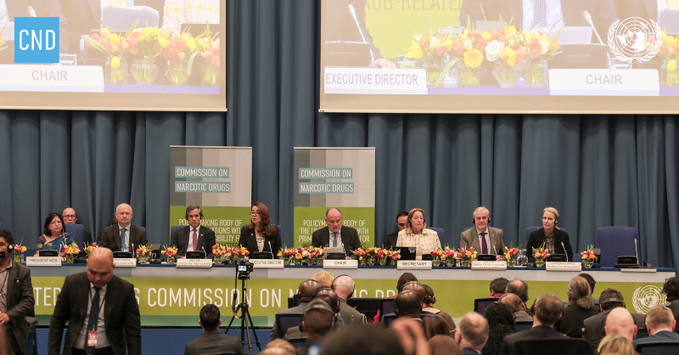Statement by Jagjit Pavadia, President,
International Narcotics Control Board (INCB)
Opening of the sixty-sixth session of the Commission on Narcotic Drugs
13 March 2023, Vienna, Austria

Mr. Chair, Excellencies, Ladies and Gentlemen,
It is an honour to represent the International Narcotics Control Board at the opening of the sixty-sixth session of the Commission on Narcotic Drugs.
The Commission and States parties to the international drug control conventions face a number of serious challenges to health and wellbeing, which will be discussed in detail during the session. I will briefly highlight five critical global challenges from the Board's perspective.
1. INCB reiterates its concern over the trend to legalize the use of cannabis for non-medical purposes in a limited number of countries. This the focus of the thematic chapter of the INCB 2022 Annual Report, which was published last week.
The drug control conventions require that the use of internationally controlled narcotic drugs and psychotropic substances be limited to medical and scientific purposes and use for any other purpose is contrary to the provisions of the conventions. Under the 1961 Convention, cannabis is classified in Schedule I as a highly addictive substance liable to abuse. However INCB's analysis finds that legalization of cannabis by some countries is reducing perceived harms of cannabis use, despite the high potency of cannabis products such as edibles and vaping products which are packaged in such a way as to appeal to children. The conventions provide sufficient flexibility to deal with cannabis-related offences of a minor nature through alternatives to incarceration and based on the principle of proportionality without resorting to legalisation.
2. The surge in illicit coca bush cultivation and cocaine production and trafficking has resulted in increased availability and use of cocaine with higher levels of purity. Changes in related criminal activity have led to an increase in secondary extraction of cocaine in Europe.
3. The opioid overdose crisis in North America has worsened due to the illicit manufacture of and trafficking in synthetic opioids. It is causing significant loss of life, and has worsened due to the illicit manufacture of and trafficking in synthetic opioids. Trafficking in fentanyl and other dangerous opioids is expanding to other regions, such as Oceania.
4. The increasing use of non-scheduled chemicals and designer precursors in illicit drug manufacture is affecting all regions of the world and all classes of illicitly manufactured drugs. INCB is concerned about the increased trafficking of non-scheduled substances and the speed with which the illicit drug industry circumvents international controls in place.
5. Disparities in the availability of and access to internationally controlled substances for medical use continue to persist and are highlighted in a special supplement to INCB's 2022 annual report, entitled "No Patient Left Behind: Progress in Ensuring Adequate Access to Internationally Controlled Substances for Medical and Scientific Purposes". INCB notes that some progress has been made but much more needs to be done, in the areas of improving the accuracy of national estimates of licit requirements, training and awareness raising among health professionals, review of legislation, regulatory and administrative changes, and measures to improve affordability.
Full implementation of the provisions of the conventions as agreed upon by State Parties is essential to addressing these challenges. The conventions remain the cornerstone of the international drug control framework and the embodiment of the international community's commitment to concerted action to address the challenges posed by the world drug problem.
The stated goal of the conventions is to safeguard the health and welfare of humankind. Respect for human rights is of fundamental importance in the design, implementation and delivery of drug policies founded upon human dignity and free of stigma.
Policies pursued in the name of drug control which violate internationally recognised human rights norms are inconsistent with the obligations incumbent upon States in the drug control conventions.
The treatment of drug-related behaviours, particularly those of a minor gravity or those committed by people who use drugs may, under the conventions, be dealt with through alternatives measures. INCB encourages State parties to examine this approach, in light of the fact that past approaches that relied excessively on criminal justice responses may have discouraged treatment and promoted stigma and have disproportionately affected minority and vulnerable groups.
INCB remains concerned about the ongoing situation in Afghanistan and reiterates its willingness to assist the international community and the Afghan people in any manner it can.
With respect to the earthquake having struck Türkiye and Syria, INCB offers its condolences to the affected countries and the families of the victims. INCB has reminded States of the possibility to expedite the provision of controlled substances intended for medical treatment during emergencies.
In closing, I wish the Members of the Commission a successful sixty-sixth session, and offer the Board's full support to improve implementation of the conventions and towards achieving health and welfare goals of the drug control conventions and Sustainable Development Goals.
Thank you.